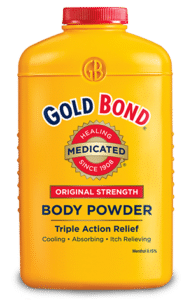Talcum Powder Side Effects
The most serious potential side effect of talcum powder use by women for feminine hygiene is ovarian cancer, which occurs when talc particles enter the ovaries through the vagina.
According to the International Journal of Gynecological Cancer, frequent talcum powder use on the female genital area increases the risk of ovarian cancer between 30–60%. The more often a woman uses it, the more likely she will eventually be diagnosed with ovarian cancer.
Free Case Evaluation: If you were diagnosed with cancer after using Gold Bond Baby Powder, you should contact our law firm immediately. You may be entitled to a settlement by filing a Gold Bond lawsuit and we can help.
How Can Talc Cause Cancer?
Although the exact mechanism by which talcum powder causes ovarian cancer is still unknown, one theory involves chronic inflammation of the genital area, as talc particles travel through the uterus, up to the fallopian tubes and ovaries. Other than direct contact with the mucous membrane, talc may also suppress some antibodies that usually protect against cancer, increasing the risk of cancer.
Talcum Powder Cancer Studies
The following studies have found links between the use of talc products for feminine hygiene and an increased risk for ovarian cancer:
- A case-controlled study published in the journal Cancer in 1982 found that women who “regularly used talc either as a dusting powder on the perineum or on sanitary napkins” were 1.92 times (92%) more likely to develop ovarian cancer.
- Study published in the American Journal of Epidemiology (PDF) in 1987 found that “women with a history of perineal dusting” were 1.6 times (60%) more likely to develop ovarian cancer.
- Meta-study published in the Journal of Epidemiology and Community Health in 2008 pooled together more than 20 studies and found a 35% increase in the risk of ovarian cancer in women who used talc powder.
Ovarian Cancer Symptoms
- Bloating
- Pelvic or abdominal pain
- Trouble eating or feeling full quickly
- Urinary symptoms such as urgency (always feeling like you have to go) or frequency (having to go often)
Can I Participate in a Class Action Lawsuit?
Several class action lawsuits have been filed against the manufacturers of talcum powder products; however, they are merely seeking refunds for consumers who purchased the products rather than on behalf of cancer victims. Our lawyers are currently only filing individual lawsuits for people who were diagnosed with ovarian cancer after using talc products for feminine hygiene. If our lawyers determine that you have a valid claim, you could be eligible to participate in a settlement which includes compensation to assist with medical expenses, lost wages, pain and suffering, and other damages.
Talc Cancer MDL
In Oct. 2016, the U.S. Judicial Panel on Multidistrict Litigation (JPML) consolidated all federal lawsuits alleging cancer from Johnson & Johnson’s talcum powder products into a multidistrict litigation (MDL No. 2738) in the U.S., District Court for the District of New Jersey. At the time of the filing, there were about 50 such complaints pending in courts across the U.S.
Need More Info?
If you’d like more information on these topics, please visit our Gold Bond Powder FAQ page.
Do I Have a Gold Bond Talcum Powder Lawsuit?
The Class Action Litigation Group at our law firm is an experienced team of trial lawyers that focus on the representation of plaintiffs in talcum powder lawsuits. We are handling individual litigation nationwide and currently accepting new talc cancer cases in all 50 states.
Free Case Evaluation: Again, if you were diagnosed with cancer after using Gold Bond Baby Powder, you should contact our law firm immediately. You may be entitled to a settlement by filing a lawsuit and we can help.

